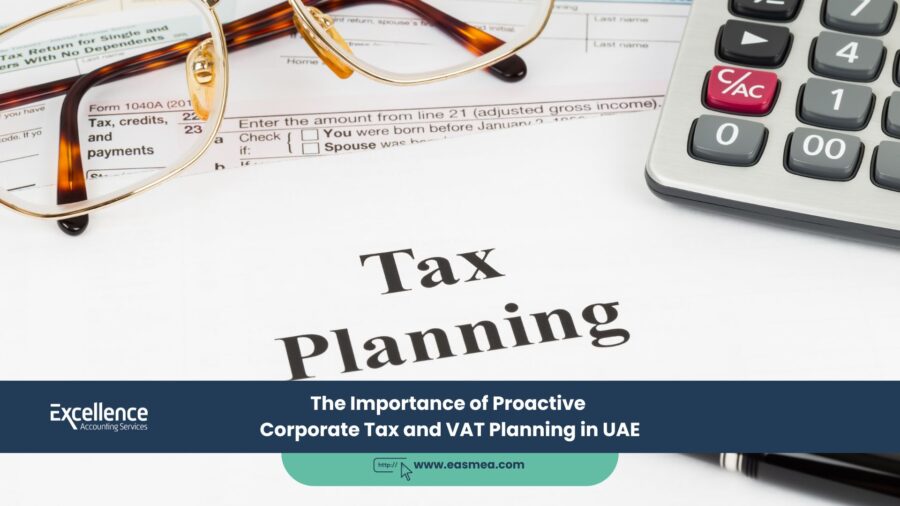The UAE’s dynamic business environment, marked by evolving regulations and a growing focus on transparency, demands a strategic approach to corporate tax and VAT. In today’s landscape, reactive compliance is no longer sufficient. Businesses must embrace proactive planning to optimize their tax liabilities, mitigate risks, and secure long-term financial stability.
- Understanding the Evolving UAE Tax Landscape
- The Role of Technology in Proactive Tax Planning
- Strategic Approaches to Corporate Tax and VAT Optimization
- The Impact of Global Trends on UAE Tax Planning
- Embracing Digitalization and Cloud Solutions
- Navigating Fintech Trends and Cybersecurity
- The Importance of Professional Tax Advisory Services
- What Excellence Accounting Services Can Offer:
- Future of Accounting and Financial Services in the UAE
- Frequently Asked Questions (FAQ)
- Conclusion: Securing Your Financial Future with Proactive Planning
- Ready to Optimize Your Tax Strategy?
This blog post delves into the critical role of proactive tax and VAT planning in the UAE, exploring how it aligns with the future of accounting and financial services, and provides actionable insights for businesses to navigate this complex landscape.
The future of accounting is rapidly transforming, driven by technological advancements and shifting regulatory landscapes. In the UAE, where the introduction of corporate tax has added a new layer of complexity, businesses must adapt to these changes. Proactive tax planning, therefore, is not just a compliance requirement but a strategic imperative that can significantly impact a company’s bottom line and long-term success.
Key Takeaways:
- Proactive tax planning ensures compliance and optimizes financial efficiency.
- Understanding the UAE’s evolving tax landscape is crucial for business sustainability.
- Technological advancements, including AI and automation, are reshaping the future of financial services and tax planning.
- Effective risk management and financial forecasting are integral to proactive tax strategies.
- Partnering with experienced professionals can enhance tax planning effectiveness.

Understanding the Evolving UAE Tax Landscape
Navigating the Corporate Tax Regime
The introduction of corporate tax in the UAE has fundamentally altered the financial landscape for businesses. Proactive planning involves a thorough understanding of the tax laws, identifying potential tax liabilities, and developing strategies to minimize them. This includes optimizing deductions, utilizing available exemptions, and ensuring compliance with reporting requirements.
The corporate tax regime in the UAE is designed to align with international best practices and promote sustainable economic growth. Businesses must stay updated on any changes to the legislation, including amendments to tax rates, eligible deductions, and reporting obligations. Proactive planning allows businesses to adapt to these changes seamlessly and avoid costly penalties.
| Aspect | Description | Importance for Proactive Planning |
|---|---|---|
| Tax Rates | 9% on taxable profits exceeding AED 375,000 | Optimizing profit distribution and tax liabilities. |
| Exemptions | Specific exemptions for certain sectors and activities | Identifying and leveraging available exemptions. |
| Transfer Pricing | Regulations for related party transactions | Ensuring compliance and avoiding disputes. |
| Tax Filing | Annual tax returns and compliance requirements | Implementing robust record-keeping and reporting systems. |
Mastering VAT Compliance
VAT compliance in the UAE requires meticulous record-keeping, accurate reporting, and timely filing. Proactive VAT planning involves implementing systems and processes to ensure compliance, minimize errors, and optimize cash flow. This includes understanding input VAT recovery rules, managing output VAT liabilities, and staying updated on any changes to VAT legislation.
Effective VAT management is crucial for businesses to maintain financial stability and avoid penalties. Proactive planning enables businesses to streamline their VAT processes, identify potential risks, and implement mitigation strategies. Additionally, staying informed about accounting trends 2025 and how they apply to VAT is important.
The UAE’s corporate tax regime is designed to align with international standards.
Accurate VAT management is essential for financial stability.
Proactive planning can mitigate risks and optimize cash flow.
The Role of Technology in Proactive Tax Planning
Leveraging Financial Services Technology
The future of financial services is heavily reliant on technology. Proactive tax planning involves leveraging advanced tools and software to automate processes, improve accuracy, and enhance efficiency. This includes cloud accounting software, tax compliance platforms, and data analytics tools.
Financial services technology such as AI-powered tax software, can analyze large volumes of data to identify patterns, trends, and potential risks. This enables businesses to make informed decisions and optimize their tax strategies. Moreover, digital transformation accounting is becoming vital for accurate tax data.
Implementing AI and Automation in Finance
AI in accounting and automation in finance are revolutionizing tax planning. Automation can streamline routine tasks, such as data entry, calculations, and reporting, freeing up valuable time for strategic analysis. AI can analyze complex tax scenarios, identify potential risks, and provide insights for optimizing tax liabilities.
Steps:
- Identify areas for automation in tax processes.
- Implement AI-powered tax software for data analysis.
- Integrate cloud accounting for real-time data access.
- Utilize data analytics for financial forecasting.
- Ensure cybersecurity measures to protect financial data.
| Tool | Function | Benefits |
|---|---|---|
| Cloud Accounting | Real-time financial data access | Improved accuracy, collaboration, and efficiency. |
| AI-Powered Tax Software | Automated data analysis and risk assessment | Enhanced decision-making and risk mitigation. |
| Data Analytics Platforms | Financial forecasting and trend analysis | Strategic planning and optimization. |
| Cybersecurity Software | Data protection | Protect financial data from breaches. |
Strategic Approaches to Corporate Tax and VAT Optimization
Effective Risk Management
Proactive tax planning involves identifying and mitigating potential tax risks. This includes conducting regular audits, implementing robust internal controls, and staying updated on regulatory changes. Effective risk management strategies are essential to avoid costly penalties and maintain financial stability.
By conducting regular risk assessments, businesses can identify potential areas of non-compliance and implement corrective measures. This proactive approach minimizes the likelihood of disputes with tax authorities and ensures long-term financial health.
Financial Forecasting and Budgeting
Accurate financial forecasting and budgeting are crucial for proactive tax planning. By projecting future revenues and expenses, businesses can estimate their tax liabilities and develop strategies to optimize them. This includes identifying potential deductions, utilizing available exemptions, and managing cash flow.
Effective budgeting allows businesses to allocate resources strategically and minimize tax liabilities. By aligning financial plans with tax strategies, businesses can ensure compliance and optimize their financial performance.
“Proactive tax planning is not just about compliance; it’s about strategic financial management. It’s about anticipating future challenges and opportunities and positioning your business for long-term success.”
The Impact of Global Trends on UAE Tax Planning
ESG Reporting Finance
ESG reporting finance is increasingly important for businesses worldwide, including in the UAE. Proactive tax planning involves integrating ESG considerations into financial strategies, ensuring compliance with sustainability reporting requirements, and leveraging available incentives for sustainable practices.
Businesses that prioritize ESG factors can enhance their reputation, attract investors, and improve their long-term financial performance. Proactive tax planning allows businesses to align their financial strategies with their sustainability goals and contribute to a more sustainable future.
Sustainable Finance and Compliance
Sustainable finance and regulatory compliance are critical aspects of modern tax planning. Businesses must stay updated on evolving regulations related to sustainable finance and ensure their tax strategies align with these requirements. This includes understanding reporting obligations, leveraging available incentives, and adopting best practices.
ESG reporting is becoming a critical aspect of financial management.
Sustainable finance practices can enhance a business’s reputation.
Staying updated on regulatory changes is essential for compliance.
Embracing Digitalization and Cloud Solutions
Cloud Computing and Data Accessibility
Cloud computing has transformed the way businesses manage their financial data. Proactive tax planning involves leveraging cloud-based solutions to enhance data accessibility, improve collaboration, and streamline reporting processes. This ensures real time data access, improving accuracy.
Cloud based accounting and tax software ensures that financial data is accessible from anywhere and at any time, allowing for more efficient collaboration between teams and departments. This is vital for remote accounting jobs.
Digitalization and Regulatory Compliance
Digitalization is revolutionizing tax administration and compliance. Proactive tax planning involves adopting digital tools and platforms to streamline reporting, enhance transparency, and ensure compliance with regulatory requirements. This includes utilizing e-filing systems, digital record-keeping, and online payment platforms.
Embracing digital solutions allows businesses to automate routine tasks, reduce errors, and improve efficiency. This is particularly important for managing VAT compliance, which requires accurate and timely reporting.
| Benefit | Description | Impact on Proactive Planning |
|---|---|---|
| Automation | Streamlining routine tasks | Reduced errors and improved efficiency. |
| Data Accessibility | Real-time access to financial data | Enhanced collaboration and decision-making. |
| Transparency | Improved reporting and audit trails | Increased compliance and reduced risks. |
| Efficiency | Streamlined processes and reduced paperwork | Cost savings and improved productivity. |
Navigating Fintech Trends and Cybersecurity
Fintech Trends and Tax Implications
Fintech trends are reshaping the financial landscape, including tax planning. Proactive tax planning involves understanding the implications of emerging fintech technologies, such as blockchain, digital currencies, and online payment platforms, on tax liabilities and compliance.
The rapid adoption of fintech solutions requires businesses to adapt their tax strategies to address the unique challenges and opportunities presented by these technologies. This includes understanding the tax treatment of digital assets, ensuring compliance with evolving regulations, and leveraging fintech tools for tax optimization.
Cybersecurity Financial Services
Cybersecurity financial services are crucial for protecting sensitive financial data and ensuring compliance with data privacy regulations. Proactive tax planning involves implementing robust cybersecurity measures to safeguard financial information, prevent data breaches, and maintain the integrity of tax records.
With the increasing reliance on digital technologies, businesses must prioritize cybersecurity to protect themselves from cyber threats and ensure the confidentiality of sensitive financial data. This includes implementing strong authentication protocols, encrypting data, and conducting regular security audits.
Fintech trends are transforming tax planning.
Cybersecurity is essential for protecting financial data.
Proactive measures can mitigate cyber risks.
The Importance of Professional Tax Advisory Services
Partnering with Experienced Tax Consultants
Proactive tax planning requires specialized knowledge and expertise. Partnering with experienced tax consultants can provide businesses with valuable insights, guidance, and support in navigating the complexities of the UAE tax landscape. This includes developing tailored tax strategies, ensuring compliance with regulatory requirements, and optimizing tax liabilities.
Tax consultants can also help businesses stay updated on evolving tax laws and regulations, identify potential tax risks, and implement mitigation strategies. Their expertise can significantly enhance a business’s tax planning effectiveness and ensure long-term financial stability.
Tailored Tax Solutions and Compliance Support
Professional tax advisory services offer tailored solutions and compliance support to meet the unique needs of each business. This includes conducting tax audits, providing tax planning advice, and assisting with tax filings. By leveraging the expertise of tax professionals, businesses can ensure compliance, minimize tax liabilities, and optimize their financial performance.
Tax professionals can provide comprehensive support in managing VAT compliance, including input VAT recovery, output VAT calculation, and VAT filing. They can also assist with corporate tax planning, including optimizing deductions, utilizing available exemptions, and ensuring compliance with transfer pricing regulations.
“In the dynamic UAE business environment, proactive tax planning is not a luxury but a necessity. Partnering with experienced tax consultants can provide businesses with the expertise and support they need to navigate the complexities of the tax landscape.”
What Excellence Accounting Services Can Offer:
Excellence Accounting Services offers comprehensive tax advisory and compliance services to businesses in the UAE. Our team of experienced tax professionals can provide tailored solutions to meet your specific needs, including:
- Corporate tax planning and compliance
- VAT registration, filing, and compliance
- Tax audits and risk assessments
- Financial forecasting and budgeting
- ESG reporting and sustainable finance advice
- Digitalization and cloud accounting solutions
- Cybersecurity and data protection
- Training and workshops on tax regulations
We are committed to helping businesses navigate the complexities of the UAE tax landscape and achieve their financial goals.
Future of Accounting and Financial Services in the UAE
Adapting to Digital Transformation Accounting
The future of accounting and financial services in the UAE is intrinsically linked to digital transformation accounting. This entails the integration of advanced digital technologies into traditional accounting practices. Proactive tax planning must adapt to these changes, ensuring that businesses are leveraging digital tools for efficiency and accuracy.
Digital transformation in accounting involves adopting cloud-based accounting solutions, AI-powered analytics, and automated reporting systems. These tools enable businesses to streamline their financial processes, improve data accuracy, and enhance decision-making.
Embracing Blockchain and Data Analytics
Blockchain technology and data analytics are poised to revolutionize financial services and tax planning. Proactive tax planning involves understanding the potential applications of these technologies and leveraging them to optimize tax strategies. Blockchain can enhance transparency and security in financial transactions, while data analytics can provide valuable insights for financial forecasting and risk management.
By embracing blockchain technology, businesses can ensure the integrity and security of their financial data, reducing the risk of fraud and errors. Data analytics tools can help businesses identify trends, patterns, and anomalies in their financial data, enabling them to make informed decisions and optimize their tax strategies.
Points:
- Digital transformation is reshaping accounting practices.
- Blockchain technology enhances data security and transparency.
- Data analytics provides valuable insights for financial forecasting.
Frequently Asked Questions (FAQ)
Conclusion: Securing Your Financial Future with Proactive Planning
In the dynamic and evolving business landscape of the UAE, proactive corporate tax and VAT planning is not just a compliance requirement but a strategic imperative. By understanding the evolving tax regime, leveraging technology, and partnering with experienced professionals, businesses can optimize their tax liabilities, mitigate risks, and secure long-term financial stability. The future of accounting and financial services demands a proactive approach, where businesses anticipate changes, embrace innovation, and prioritize compliance.
The introduction of corporate tax and the ongoing evolution of VAT regulations underscore the importance of staying ahead of the curve. By embracing digital transformation, leveraging AI and automation, and prioritizing cybersecurity, businesses can streamline their tax processes and enhance their financial performance. Moreover, integrating ESG reporting and sustainable finance practices into tax strategies can enhance a business’s reputation and contribute to a more sustainable future.
Ultimately, proactive tax planning is about creating a resilient and sustainable financial foundation for your business. It’s about anticipating challenges, seizing opportunities, and ensuring that your financial strategies are aligned with your long-term goals. By taking a proactive approach, businesses can navigate the complexities of the UAE tax landscape and achieve sustainable growth.




